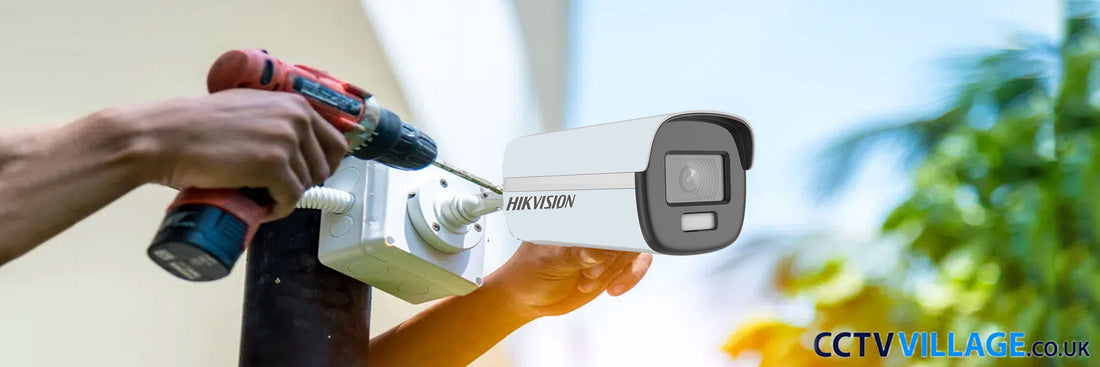When installing a CCTV system, one of the key decisions is whether to opt for a DIY kit or hire someone to do it for us. Each option has particular benefits, depending on your technical skills, security needs, and budget. In this article, we will explore both options and outline important safety considerations during installation, as well as the convenience of plug-and-play CCTV systems, to help you make the best choice for securing your property.
At cctvvillage.co.uk, we offer a wide range of systems for both DIY and professional surveillance. Whether you prefer a hands-on approach or want the assurance of a professional setup, we can help you find the right solution.
DIY CCTV Systems
DIY security systems can be a cost-effective option for those with some technical ability. Many modern CCTV systems are designed for easy installation, with straightforward setup instructions and minimal tools required. Plug-and-play CCTV systems are particularly popular, as they eliminate much of the complexity associated with traditional installations.
Advantages of DIY CCTV Systems
- Cost Savings: One of the primary reasons to choose DIY surveillance is the potential to save money, as you avoid the cost of hiring technicians.
- Convenience with Plug-and-Play CCTV Systems: Many CCTV systems now feature plug-and-play setups, which simplify the installation process. These systems typically require minimal configuration cameras are pre-configured to work with the recorder, and you can simply connect them to power and your network. This ease of installation makes DIY security systems much more accessible to non-technical users.
- Full Control: You have complete autonomy over where cameras are placed. This allows you to experiment with different camera angles or locations to suit your needs.
Disadvantages of DIY CCTV Systems
- Technical Challenges: While plug-and-play systems are designed to be easy, there can still be technical difficulties, particularly when configuring network settings or handling more complex wired setups.
- Limited Expertise: Without professional guidance, you may miss optimal camera placements, which can leave blind spots or weaken your security system.
- Time and Effort: DIY surveillance can be time-consuming, particularly for those unfamiliar with CCTV technology. Resolving issues may also require additional effort.
Safety Considerations for DIY Security Systems
When positioning a CCTV system yourself, it is essential to consider safety precautions:
- Electrical Safety: Many CCTV systems involve wiring. Ensure that power sources are handled carefully, and if you are unsure about electrical work, it may be a good idea to consult an electrician.
- Ladder Safety: Installing outdoor cameras often requires the use of ladders. Ensure you follow ladder safety protocols, such as positioning it on a stable surface and not overreaching.
- Secure Installation: Properly secure cameras, cables, and other components to avoid accidents or damage over time. Loose wires or poorly mounted equipment could lead to hazards.
Technical CCTV Security Systems
Technical CCTV security systems offer a more straightforward, hassle-free option. Experts handle everything, from positioning cameras to configuring the system. This is particularly beneficial for larger properties or advanced security needs.
Advantages of Technical Security Systems
- Expert Placement: Professionals know the best positions to place cameras for optimal coverage, minimising blind spots and ensuring comprehensive protection.
- Quick and Efficient: A professional CCTV setup can be completed more quickly and with less disruption than a DIY approach, ensuring your system is operational sooner.
- Customisation: For complex systems with multiple cameras, motion sensors, and remote monitoring, a professional will ensure everything is integrated and functioning correctly.
- Ongoing Support and Warranty: Many professional electricians offer warranties on their work, along with ongoing technical support if you encounter any issues.
Disadvantages of Technical Security Systems
- Higher Cost: The primary downside of technical security systems is the higher cost compared to a DIY option. However, for many, the peace of mind and efficiency can outweigh this expense.
- Scheduling: You may have to work around the installer’s availability, which could result in delays if their schedule is full.
Safety Considerations for Technical Security Systems
Even with professional installation, there are safety factors to be mindful of:
- Qualified Electricians: Always ensure that you hire qualified and experienced electricians to avoid issues such as improper wiring or system setup, which can lead to malfunctions or even accidents.
- Insurance Coverage: Ensure that the installation team is insured. This protects you in case of accidental damage to your property during installation.
Which Option Should You Choose?
The decision between DIY and professional CCTV systems largely depends on your property size, security needs, and technical abilities. For smaller properties, a DIY kit may offer an affordable and straightforward solution, particularly with the convenience of plug-and-play CCTV systems. However, for larger or more complex properties, the technical CCTV security systems provides expert knowledge and ensures a reliable setup.
In conclusion, both DIY and professional CCTV systems come with their own advantages and challenges. While DIY kits can save costs and offer flexibility especially with plug-and-play CCTV systems technical surveillance ensures expertise and efficiency. Safety should always be a top priority during the installation process, whether you are doing it yourself or relying on an electrician. Consider your needs and circumstances to make the best decision for your property.

